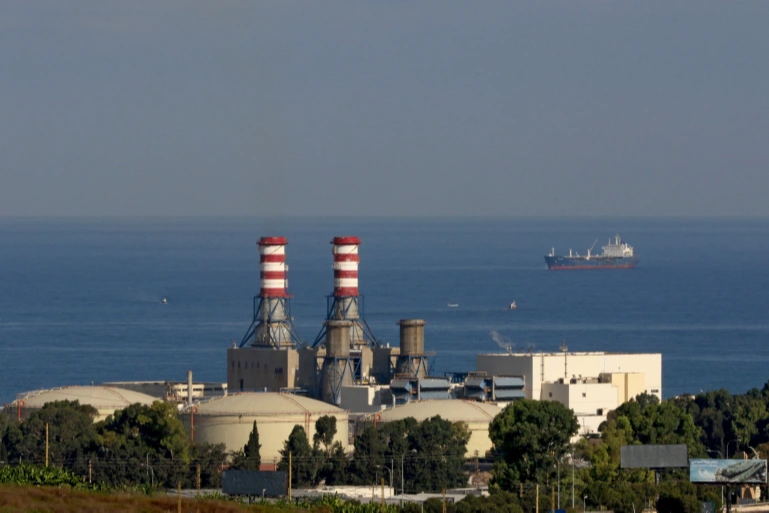
An oil tanker carrying oil from Iraq is seen anchored near the Zahrani power plant in Zahrani near the southern Lebanese city of Saida [File: Mahmoud Zayya/AFP]
Beirut, October 9 (RHC) -- The two main power plants in crisis-hit Lebanon have gone out of commission, effectively stopping all state electricity in the country.
The shutdown on Saturday of the Deir Ammar and Zahrani plants, which have generated very limited electricity in recent months, took place due to a diesel fueul shortage, sources said.
“There is no fuel and limited generation, so the variation in frequency is ruining the grid,” Marc Ayoub, energy researcher at the American University of Beirut’s Issam Fares Institute, told Al Jazeera. “It’s happened about 16 times over the past two weeks because generation is too little compared to what is needed for the grid to reach stability.”
EDL has been generating less than 200 megawatts of electricity. Local media reported the authorities were scrambling to secure fuel from their reserve stock to partially resupply state electricity to several affected areas.
EDL said in a statement that a fuel shipment will arrive Saturday night and will be unloaded early next week to raise power plant capacities to 500 megawatts. Another fuel shipment from an Iraq deal will arrive later this month. In the meantime, EDL said it is communicating with oil facilities in Tripoli and Zahrani to purchase a limited amount of fuel to supply the power plants for the next few days.
The development in Lebanon’s ongoing electricity crisis comes about a week after two floating Turkish power barges off the coast stopped generating power after the expiration of a government contract.
EDL continues to struggle financially to secure fuel to run its power plants. Throughout the year, it has relied on cash advances from the central bank and other stopgap measures to stay functional.
Lebanon’s ongoing electricity woes have exacerbated a crippling economic and financial crisis that plunged three-quarters of the population into poverty and devalued the Lebanese pound by almost 90 percent.
The fuel crisis has paralysed much of public life, forcing much of the population to rely almost entirely on expensive private generators to keep the lights on. Hospitals have struggled as well, fearing the safety of their patients.
Iran-backed Hezbollah has delivered shipments of Iranian fuel into the country via Syria through illegal border crossings. Meanwhile, the Lebanese government continues to talk with their Egyptian, Jordanian, and Syrian counterparts to implement a plan that would provide the country with electricity through Egyptian natural gas.
Lebanon has also secured a swap deal with the Iraqi government for high sulfur fuel in exchange for medical services, where Lebanon would then exchange the fuel with a supply that is compatible with its power plants.
Lebanon’s ineffective electricity sector is also extremely expensive. In a May 2020 presentation to international donors, the government estimated that the electricity sector costs about $1.6 billion in public funds every year, though some reports say it can bleed up to $2 billion. That is about 3 percent of the country’s entire economy, and experts have told Al Jazeera it makes up for almost half of the cash-strapped country’s public debt.
However, any serious reform has been obstructed by corruption and vested interests among the country’s handful of political parties, according to the experts.
Lebanon’s recently-appointed Prime Minister Najib Mikati said one of his priorities was to resolve the country’s crippling fuel crisis, and to resume negotiations for an International Monetary Fund-approved programme to recover the country’s battered economy.

